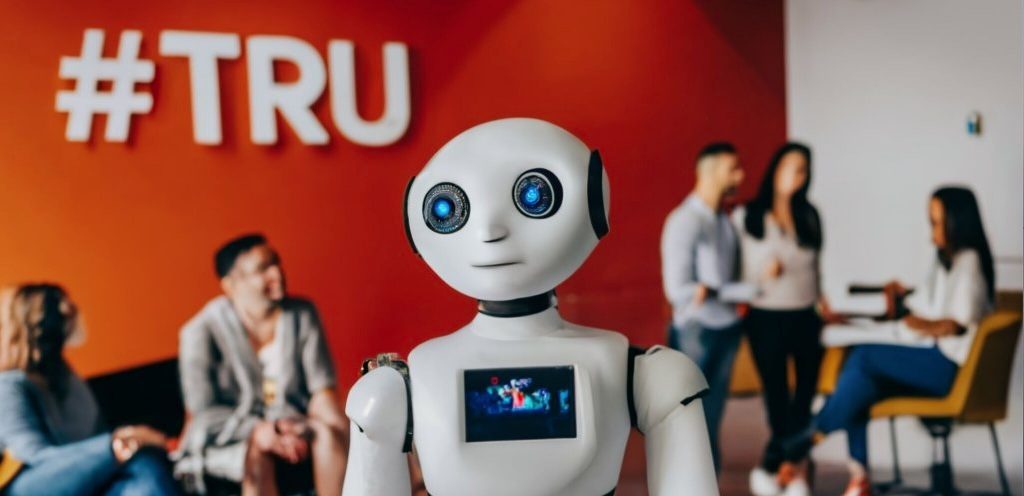For its 10th edition, Trumontreal, the “unconference” on recruitment, chose to move away from the original concept (“no speaker, no Powerpoint presentation, no badge”) to offer its participants an accelerated update on the manipulation of personal data and the potential of AI in recruitment. A look back at the November 21 event, of which Isarta is a partner.
Trainer Sandrine Théard, founder and organizer of the event, couldn’t have chosen a better venue: Trumontreal took place this year at the Centre de recherche informatique de Montréal, a benchmark for the deployment of AI in business. Right from the opening presentation, the woman who also founded the École du recrutement – Les Sources humaines explained the change in formula to the 130 participants gathered in the main hall:
This year, we’re doing things a little differently. Why? Because there’s something that’s changing life, and that’s AI. It’s coming onto the market. I think it’s essential today, as recruiters or HR professionals, to understand what it’s all about. Today, moderators will be there to bring you content, whereas in previous years they were more in group facilitation mode.”
The Trumontreal founder firmly believes in the “evangelizing” mission of AI in recruitment, while making it clear that she’s in favor of “ethical and responsible” use.
We have a responsibility to know, to be aware of [the potential and implications of] AI. When social networking came along, it was kind of our role to explain to our customers and employees how it works. And not to pretend it didn’t exist. Today, it’s the same thing with AI: we have to ask ourselves how we can use it in companies and with our employees.”
The Trumontreal instigator explains that she herself wants to stay at the front of the AI parade.
Personally, I don’t want my customers to be more educated about artificial intelligence than I am. If we want to keep our strategic role, we have to be educated on the issue.”
A theme that resonates
Having talked to a few participants about coffee vending machines, 2023’s choice of theme clearly struck a chord. After missing out on the last few editions, one lady who works “in governance” confided to us that she was renewing her acquaintance with the event specifically to get up to speed on the subject of AI and better understand the law on the protection of personal data.
Recruiters Martha and Angelina, who bump into each other and fraternize year after year at the unconference, argued that the topic of AI was a must for them too.
The recruitment sector is lagging behind,” notes Martha. The adoption of this technology has been much faster in education, sales or marketing. It’s now up to us to make the tool our own and understand how it can help us in our work.”
The latter were well served with a beefy program, including introductions to the basics of AI with HR technology expert Jean-Baptiste Audrerie and to Bill 25 on data protection by lawyer Cynthia Chassigneux, founder of CHX Avocat and former administrative judge of Quebec’s Commission d’accès à l’information.

In defense of the “human” factor
Beyond the rhetoric heard (“AI is here, we’ve got to deal with it”), the discussions that enlivened the day nevertheless revealed a divide between supporters of “all things AI” – embodied for the occasion by the likeable founder of AppyHere Martin Mathe – and a category of recruiters who are – shall we say – wary, septic or simply critical of this technology.
When asked before the workshops began, Inès – a French-born recruiter with an IT background – was very skeptical about the effectiveness of today’s algorithms, whether in a recruitment platform like LinkedIn or elsewhere.
During the discussion “Recruiter, candidate and AI, together and against all?” moderated by Beneva’s Karim Mabrouky, recruiter Julien-Pier Boisvert pointed out, with great aptness, that data from the last forty years in IT recruitment was corrupted by gender and cultural bias in a sector dominated by “white men”.

The tenth edition of Trumontreal brought laughter and smiles (mainly from the video of a very expressive baby, during Pierrich Plusquellec’s conference on “Can AI feed our emotional intelligence”), but also gritted teeth with some lively debates. Above all, it will have advanced thinking on the deployment of AI in a fundamentally “human” sector, namely human resources.




